Percentages Teaching Resources
Browse printable worksheets, Google slides activities and more for teaching percentages in the elementary math classroom.
Explore editable resources you can easily differentiate for individual learners plus math center activities and engaging games to help students understand how to calculate percentages, how to find the percentage of a number and more.
This collection of curriculum-aligned printable and digital resources has been created just for teachers by the teachers on the Teach Starter team. That means each resource has undergone an in-depth review before being published to ensure it's ready for the classroom and your students!
New to teaching this section of the math curriculum? Read on for a guide to percentages from our teacher team!
What Are Percentages? A Kid-Friendly Definition
Let's start with a definition of percentages you can share with your students!
Identified by the % sign, percentages are a way of expressing a number as a portion of 100. You can also think of percentages as a way of comparing things on a scale from 0 to 100. If something is 50 percent, for example, that means it's halfway between 0 percent (which means none) and 100 percent (which means all).
Picture a pizza. Now imagine it had 100 slices (hey, we can dream!).
If you and your friends ate 10 slices of pizza, you would have eaten 10% of the pizza! If you ate 50 slices, you would have 50% of the pizza left ... and maybe a bellyache.
How Do You Calculate Percentages?
To calculate a percentage, you need to divide the part (aka the value or quantity you want to find the percentage of) by the whole (aka the total value or quantity) and then multiply the result by 100.
To make things simpler for young math students, there's a formula for calculating a percentage:

Let's say you want to find the percentage of 50 that 20 represents. Using the formula, you would divide 20 by 50 and then multiply the result by 100, like this:
- percentage = (20 / 50) x 100
- percentage = 0.4 x 100
- percentage = 40%
How Do You Convert a Decimal Into a Percent?
Converting a decimal into a percent involves multiplying the decimal by 100 and adding a percent sign (%).
For example, let's say you have a decimal of .75.
- 0.75 x 100 = 75%
- So, the decimal 0.75 is equivalent to 75%.
A visual aid like a pie chart or a fraction bar can help illustrate this concept. For example, if you have a fraction bar that represents 1 whole, with 4 out of 5 parts shaded, that would be equivalent to a decimal of 0.8.
To convert this decimal into a percent, you would multiply it by 100 and add a percent sign, which would give you 80%.
How Do You Convert a Percent Into a Decimal?
What if you already have a percent? It's simple for students to perform the inverse operation! To convert the percent into a decimal, they need to divide it by 100, rather than using multiplication.
Let's use an example again. Let's say you want to turn 50% into its decimal form.
- 50% ÷ 100 = 0.5
- So, the percent 50% is equivalent to the decimal 0.5.
Students may also realize that you just need to move the decimal point to the left two places (because of the two zeroes in 100) to create the decimal.
How to Turn a Fraction Into a Percent
To turn a fraction into a percent, students need to first convert the fraction into a decimal, then multiply the decimal by 100 and add a percent sign.
Let's work through an example. Suppose you have a fraction of 2/5, and you want to convert it into a percent.
- Convert the fraction into a decimal by dividing the numerator (top number) by the denominator (bottom number):
- 2 ÷ 5 = 0.4
- The fraction 2/5 is equivalent to the decimal 0.4.
- Multiply the decimal by 100 and add a percent sign:
- 0.4 x 100 = 40%
- The fraction 2/5 is equivalent to the percent 40%.
How to Find the Whole When Given a Part and the Percent?
One of the math skills students will learn as part of their percent instruction is finding the whole when they have been given the part and the percent.
This can be done using the formula Whole = (Part ÷ Percent) × 100.
Let's break it down, step by step:
- Let's say 8 students, which is 25% of the class, submitted a project early. The total number number of students (the whole) is the unknown value.
- We can identify the parts of this problem and determine that 8 is the part and the percentage is 25%
- Plug in the values you know into the formula:
- Whole = (Part ÷ Percent) × 100
- Whole = (8 ÷ 25) × 100
- Whole = 32
The result you get is the whole. In this example, the total number is students is 32.
How to Find the Part When Given the Whole and the Percent
Now let's flip things around. Instead of giving your students the part and the percent, what happens if you give them the whole and the percent? Now they have to find just the part.
To do this, you'll need to multiply the whole by the percent as a fraction (percent/100).
Let's say you have a pizza that has been cut into eight equal slices (this is usually how it's done!). That's the whole pizza. Now, let's say you want to know how many slices of pizza you will get if you eat 25% of the pizza.
Percent means "per hundred," so 25% is the same as 25 per hundred or 25/100.
To find out how many slices of pizza 25% is, you can multiply the whole pizza (which is eight slices) by 25/100. Don't forget to use PEMDAS!
- 8 x (25/100) = 2
- So, if you want to eat 25% of the pizza, you would eat 2 slices.
How to Find the Percent When Given the Whole and the Part
But what if you have the whole and the part? How do you now find the percent?
To find the percent, you'll need to divide the part by the whole to get the fraction or decimal that represents the part of the whole. Then convert that decimal to a percentage.
Yes, we're going to talk about pizza again!
Let's say you have a pizza that's made up of 8 slices. You know that your whole is 8 slices.
Now let's say that you have eaten 6 slices. What percentage of the pizza have you eaten? Let's plug it into the formula:
- 6 ÷ 8 = 0.75 × 100 = 75%
- Using the process above for converting a decimal into a percent, this means that 6 slices represent 0.75 or 75% of the total number of pizza slices.
- Plus Plan
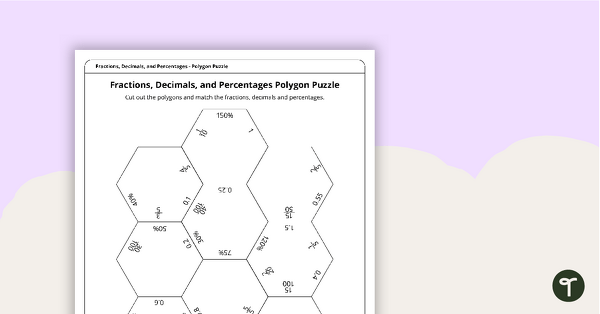
Polygon Puzzle - Fractions, Decimals, and Percentages
A polygon puzzle using equivalent fractions, decimals, and percentages.
- Plus Plan
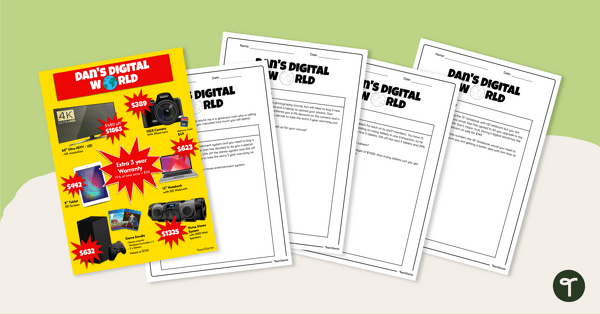
Dan's Digital World – Financial Math Worksheets
Teach financial literacy to your students using this electronics store catalogue with accompanying worksheets.
- Plus Plan
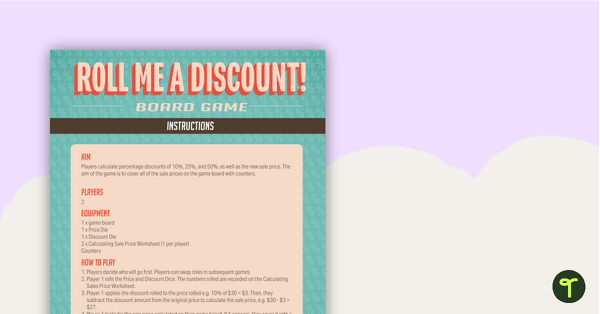
Roll Me a Discount! Board Game
An interactive game to play in pairs to consolidate understanding of discounts and sale price.
- Plus Plan

Introducing Percentages PowerPoint
A 12-slide editable PowerPoint to use when introducing percentages to your students.
- Plus Plan
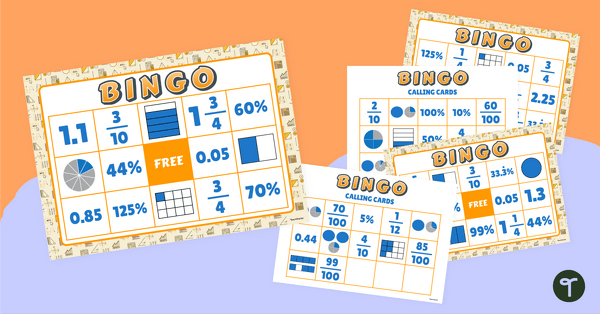
Fraction, Decimal, and Percentage Bingo
Convert between fractions, decimals and percentages with this engaging Bingo game the whole class can enjoy!
- Plus Plan
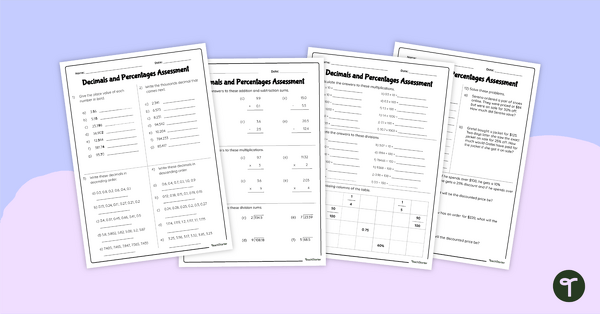
Decimals and Percentages Assessment
Assess students' knowledge of various decimals and percentages concepts with this four-page worksheet.
- Plus Plan
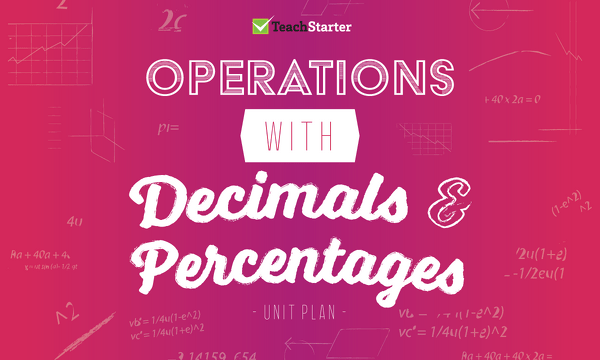
Operations with Decimals and Percentages Unit Plan
This Mathematics unit covers a range of concepts relating to decimals and percentages; specifically calculations.
- Plus Plan
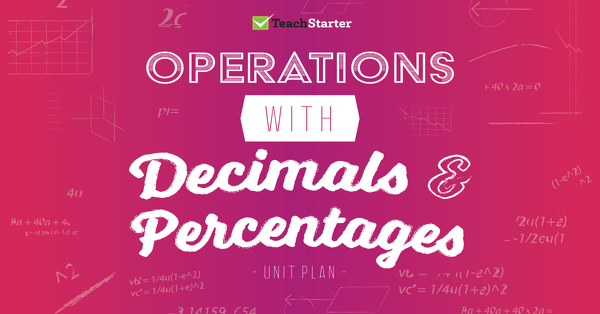
Operations with Decimals and Percentages Assessment
An assessment task in which students will demonstrate an understanding of decimals and percentages.
- Plus Plan
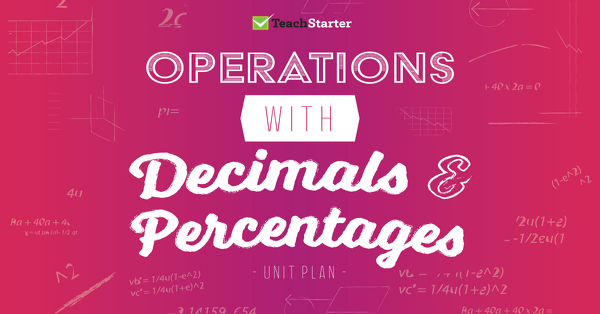
Math Investigation - Prepare to Party (3)
A 60-minute lesson in which students will apply knowledge of decimals and percentages to a real-world context.
- Plus Plan
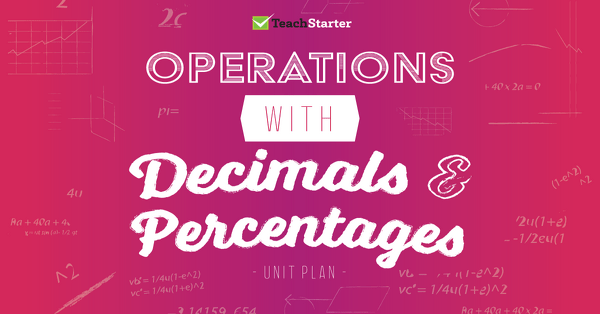
Math Investigation - Prepare to Party (2)
A 60-minute lesson in which students will apply knowledge of decimals and percentages to a real-world context.
- Plus Plan
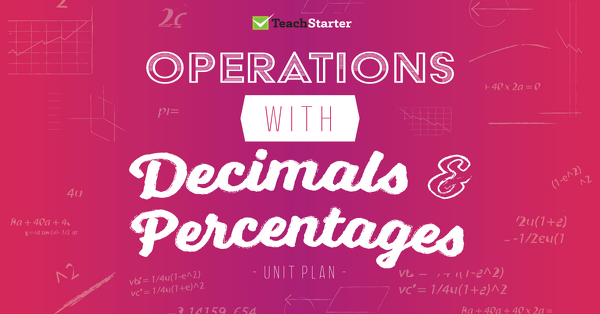
Math Investigation - Prepare to Party (1)
A 60-minute lesson in which students will apply knowledge of decimals and percentages to a real-world context.
- Plus Plan
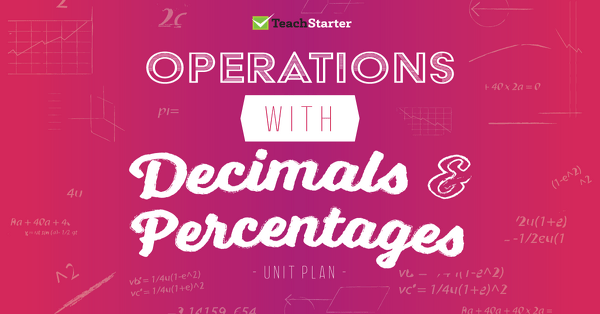
Calculating Sale Price
A 60-minute lesson in which students will calculate sale price using percentage discounts of 10%, 25%, and 50%.
- Plus Plan
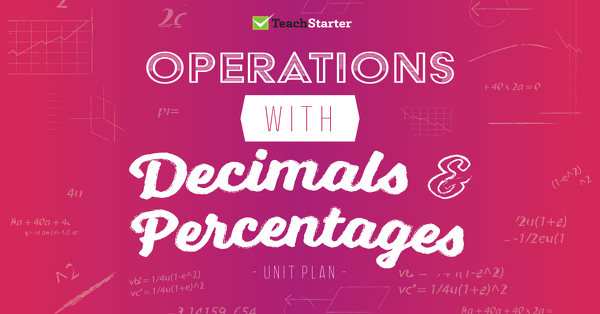
Calculating Discounts
A 60-minute lesson in which students will calculate percentage discounts of 10%, 25%, and 50%.